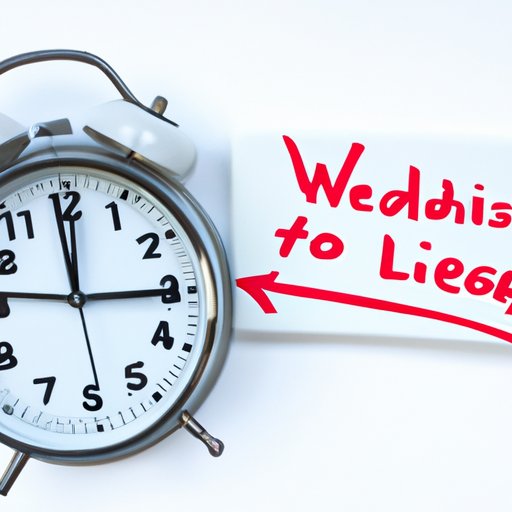
Introduction
What time should you eat dinner to lose weight? This is a question that many people wanting to lose weight ask, and it’s not surprising. The timing of your meals can impact your weight loss journey, and dinner is the last meal of the day, making it an important focal point. In this article, we’ll explore the science behind meal timing, provide tips for timing your dinner for effective weight loss, and discuss the role of circadian rhythm in your diet.
The Science of Weight Loss: Is the Timing of Your Dinner Crucial?
When it comes to weight loss, what you eat, how much you eat, and when you eat all matter. Research has shown that meal timing can impact weight loss because the timing of our meals influences our circadian rhythm and metabolism.
Eating late at night can disrupt our circadian rhythm, which is our internal process that dictates our sleep-wake cycle and can result in poor sleep quality. Poor sleep has been linked to weight gain and obesity since it can lead to overeating and negatively affect metabolism. Moreover, after dinner, your calorie intake will be not used effectively and can cause weight gain.
Studies have also shown that a consistent meal timing schedule, where you eat at the same time each day, can help regulate metabolism and support weight loss.
Finding the Sweet Spot: How to Time Your Dinner for Effective Weight Loss
So, what is the optimal time to eat dinner for weight loss? Generally, it’s best to eat dinner at least two to three hours before bedtime. If you go to bed at 10 pm, for example, aim to eat dinner between 6-7 pm. This allows for your food to be appropriately digested and won’t affect your sleep quality.
However, there is no one-size-fits-all approach to timing dinner. Your work schedule, family life, and personal preference can all impact when the best time for you to eat dinner is. For instance, if you are an early-riser, an early dinner might suit your schedule better. That said, balancing our meals, including our dinner, and distributing it in small portion sizes multiple times a day is an effective approach.
If you are not sure when the best time to eat dinner for you is, try experimenting with different times and see what works best for you. One way is to eat dinner at the same time each day for one week and adjust your schedule as necessary.
Eating for Weight Loss: How Early or Late Should Your Dinner Be?
When it comes to eating dinner, is it better to eat early or late for weight loss? Recent studies have shown that when we eat can have a significant impact on weight loss. Eating earlier dinners, in general, has been linked to a lower risk of obesity.
A study from Spain found that those who ate their last meal before 9 pm lost more weight than those who ate dinner later. Another study found that eating an earlier dinner can lower insulin levels, which can lead to weight loss.
However, eating early dinners may not be feasible for everyone’s schedule. If you have a hectic work schedule, you might not be able to eat dinner until later in the evening. Nonetheless, the bottom line is to focus on your total calorie intake more than when you eat.
Dinner on a Diet: A Guide to the Best Time for Your Last Meal of the Day
If you are on a diet, finding the best time to eat dinner is crucial to your success. Eating your dinner early, about 3 to 4 hours before bedtime, can help with digestion and improve your sleep quality, which is important for weight loss. By providing enough time for digestion, you are able to increase your metabolism when you’re awake and burn calories effectively.
Moreover, when choosing what to eat for dinner, be mindful of portion sizes. A combination of protein, complex carbohydrates, and fiber-rich vegetables is an ideal choice for dinner, helping you feel full while delivering essential nutrients.
Skipping dinner entirely is not recommended for weight loss. In fact, skipping meals can lead to increased hunger, overeating, and binge eating, resulting in an unhealthy relationship with food.
The Role of Circadian Rhythm in Weight Loss: Why Timing Your Dinner Matters
Circadian rhythm plays a significant role in regulating our metabolism and sleep-wake cycle. Our circadian rhythm is influenced by environmental cues, with melatonin and cortisol hormone levels affecting hunger and metabolism.
Eating meals at consistent times reinforces our internal clock and improves metabolic health. Studies suggest that a consistent meal timing schedule, with dinner being the last meal of the day, can promote weight loss by enhancing metabolism and reducing insulin levels.
One approach to aligning your eating schedule with your circadian rhythm is to eat during daylight hours. Another way is to keep the timing of your meals consistent, which will help reinforce your circadian rhythm.
Conclusion
In conclusion, dinner timing plays a critical role in weight loss. Eating dinner too late or skipping it altogether can negatively affect your circadian rhythm, metabolism, and overall weight loss journey. It’s important to find a dinner time that works for you, focus on portion control, and incorporate healthy foods into your meals. By prioritizing dinner timing and taking the time to experiment with what works for you, you’ll be on the right track to your weight loss goals.




